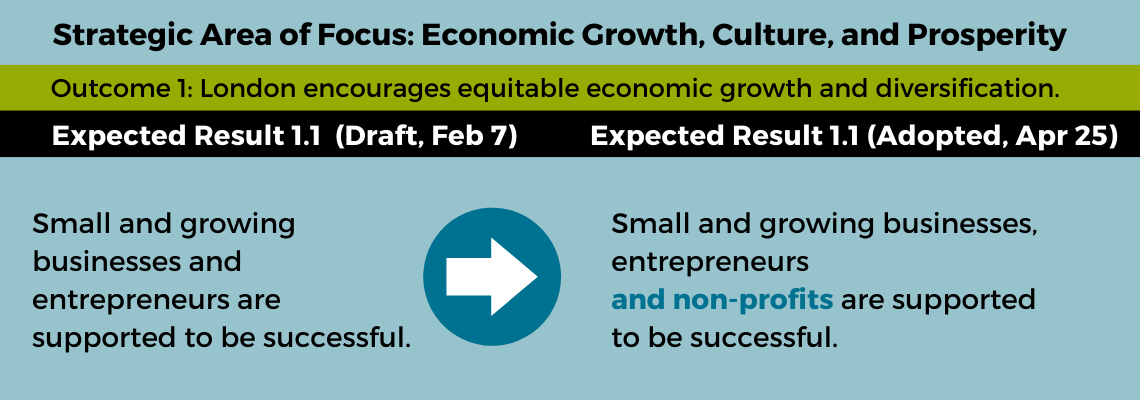
"You can't fight City Hall."-Practically Everyone
Recalling our founding mission, Pillar Nonprofit Network is committed to fostering and growing our members’ capacity for cross-sectoral collaboration, including with all levels of government. At the municipal level, this includes offering advice and recommendations on city policy with a nonprofit lens. But how do we know we can?
Given recent experiences with the development of the City’s 2023-27 Strategic Plan and the Health and Homelessness Whole of Community System Response, the opportunity to engage productively with staff and politicians at the City of London has likely never been better, and we are hoping to build on the momentum generated this past year in the development of those plans to have a positive effect on the city’s development of the 2024-2027 multi-year budget. Indeed, this will be the 'container' for conversation in a Pillar #PolicyTalk June 28. (Sign up here.)
The preparation of the City’s multi-year budget is a year-long process beginning with the development and adoption of a strategic plan that will shape expenditures throughout and one year beyond the current council term. The 2023-2027 Strategic Plan was originally presented to councillors and the community in February as a draft, and then informed by community feedback, including considerable advocacy from local nonprofits before adoption by Council in April. (Read the final version here.)
When nonprofits – or anyone – successfully influences public policy, we often frame it as “a win.” But nonprofit advocacy are wins without losers. They’re wins for the whole community. In this post, we want to highlight a few advocacy “wins” in the Strategic Plan process and the opportunities that arise from them. We’ll do this in part by comparing elements of the draft plan as presented to Council on February 7, 2023 and the Values, Strategic Areas of Focus, Expected Results, and Strategies as they appear in the final version adopted by Council April 25, 2023. And the community can celebrate a few advocacy wins in London’s Strat Plan thanks to nonprofits and other members of the community, including a new recognition of the role nonprofits play in the community’s social, cultural, and economic health. Each of these is an opportunity to advocate further for inclusion in the multi-year budget.
- Following recommendations by the London Chamber of Commerce, Pillar, the Grand Theatre, Museum London and other nonprofits and cultural organizations, the sector is now better included in the City's strategies for economic development. The social, environmental, and cultural benefits of the nonprofit sector are widely understood, if under-appreciated, but it’s easy to forget that local nonprofits also have significant economic impact, as employers, as buyers, as suppliers, and in generating spinoff economic activity. We believe that full social and economic recovery for the region will depend in part on a healthy nonprofit sector, including the contribution of nonprofit culture organizations. On behalf of this collaborative, Chamber CEO Graham Henderson made a delegation to the Council’s Strategic Priorities and Policy Committee February 28. You can read more about the recommendations here and view the presentation here. Among the outcomes:
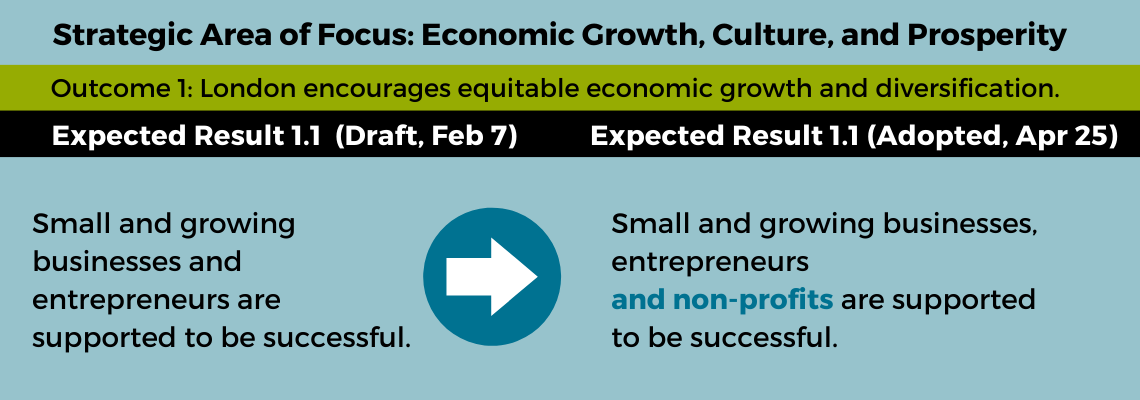
- Under the Strategic Area of Focus Economic Growth, Culture, and Prosperity and Outcome 1, London encourages equitable economic growth and diversification, the expected result, " Small and growing businesses and entrepreneurs are supported to be successful” was revised to include nonprofit organizations, thus: “Small and growing businesses, entrepreneurs and non-profits are supported to be successful.”
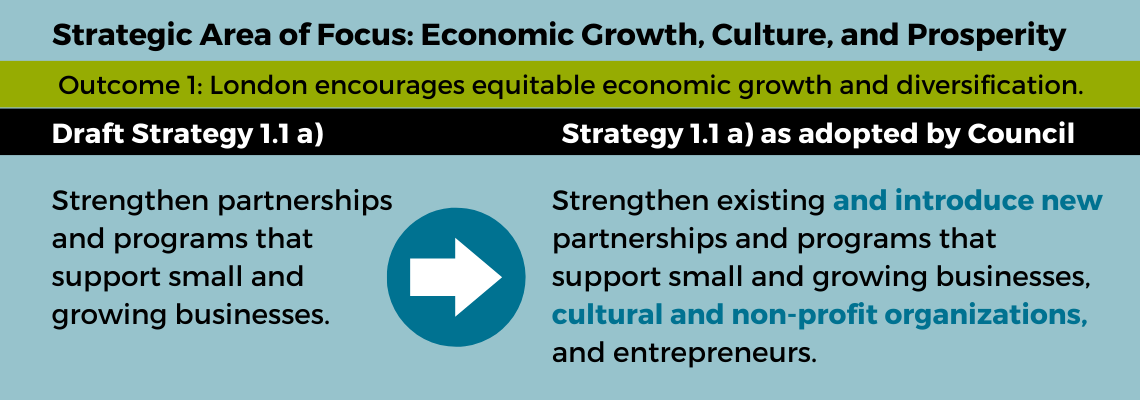
- Under the same outcome, the associated draft strategy, “Strengthen partnerships and programs that support small and growing businesses” was revised in tandem to read, “Strengthen existing and introduce new partnerships and programs that support small and growing businesses, cultural and non-profit organizations, and entrepreneurs.”
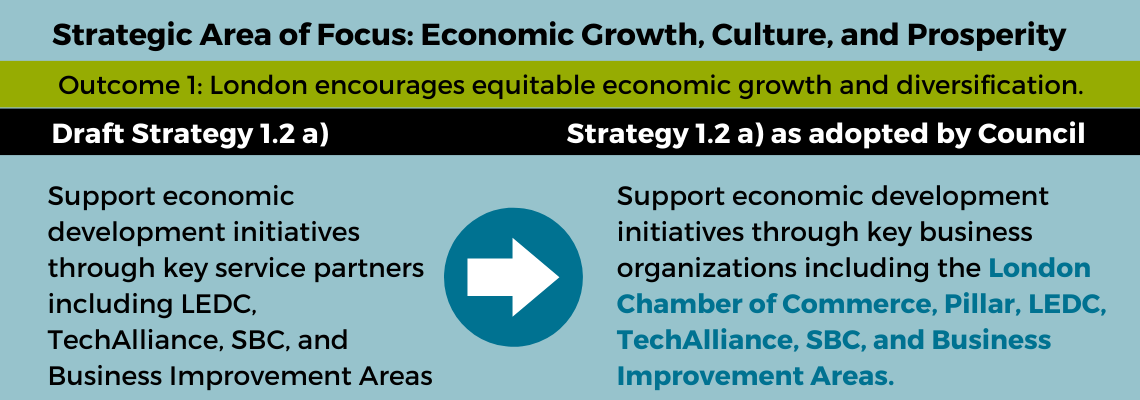
- And from the same presentation, the draft strategy, “Support economic development initiatives through key service partners including LEDC, TechAlliance, SBC, and Business Improvement Areas” was revised to include Pillar and the Chamber as potential service partners.
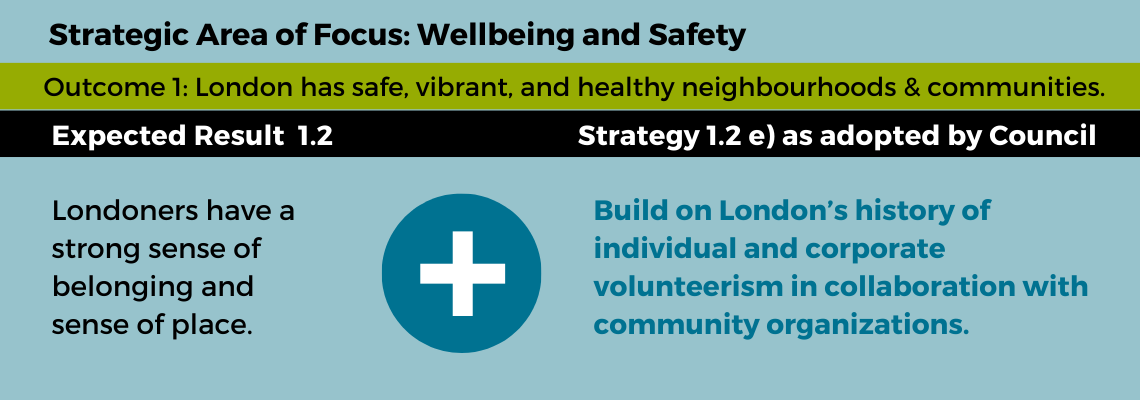
- Following a recommendation by Pillar Nonprofit Network, the City found a place in the strategic plan to support the community’s volunteerism. As we know, not all nonprofit work is performed by employees. The sector is also dependent on volunteers, and performs an important role in promoting social cohesion through volunteer work. While we were appreciative of the draft strategies under the Wellbeing and Safety Strategic Area of Focus, we noted that – like the nonprofit sector itself – this was an entirely overlooked area of attention.
- At a March 28 Public Participation Meeting, Pillar’s Interim CEO Maureen Cassidy proposed including a strategy to rebuild the disrupted volunteer ecosystem, resulting in the addition of a strategy, “Build on London’s history of individual and corporate volunteerism in collaboration with community organizations.”
-
Following a presentation at the same Public Participation Meeting by Luis Patricio of Pillar’s SDG Cities Program, considerations of mobility poverty were added to three areas of strategic focus -- Housing and Homelessness and Wellbeing and Safety in addition to Mobility and Transportation – an excellent illustration of the interconnectedness of public policy priorities and all our causes and missions.
-
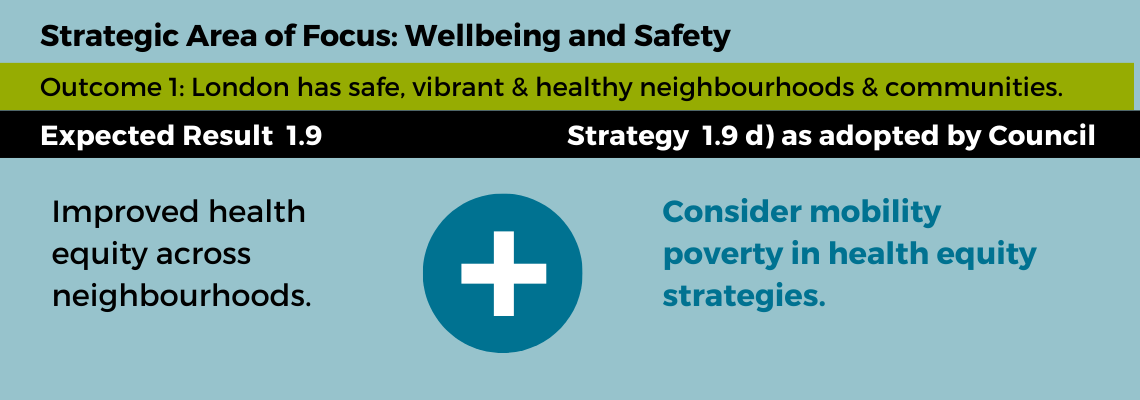 Under Wellbeing and Safety Outcome 1, London has safe, vibrant & healthy neighbourhoods & communities, the expected result “Improved health equity across neighbourhoods” now includes the strategy, “Consider mobility poverty in health equity strategies.”
Under Wellbeing and Safety Outcome 1, London has safe, vibrant & healthy neighbourhoods & communities, the expected result “Improved health equity across neighbourhoods” now includes the strategy, “Consider mobility poverty in health equity strategies.”
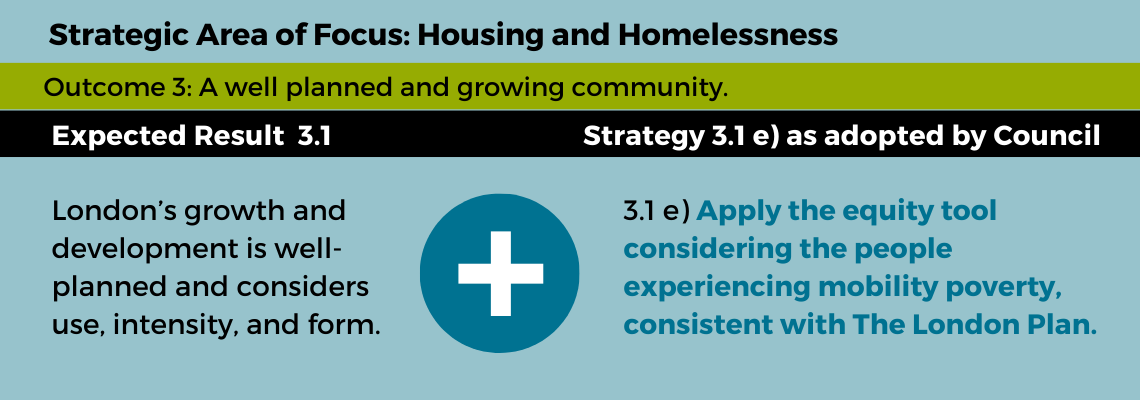
- Under Housing and Homelessness Outcome 3, A well planned and growing community, the expected result “London’s growth and development is well-planned and considers use, intensity, and form” now includes the strategy, “Apply the equity tool considering the people experiencing mobility poverty, consistent with The London Plan;” and
-
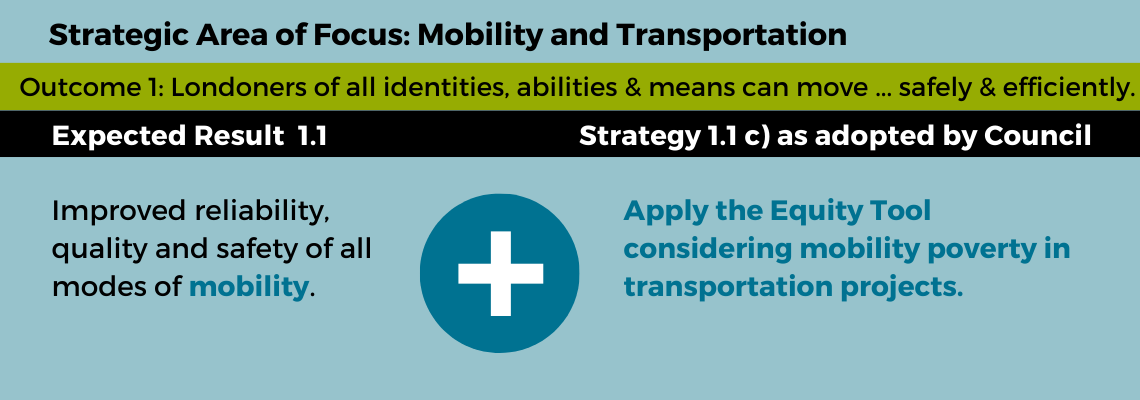 Under Mobility and Transportation Outcome 1, Londoners of all identities, abilities and means can move throughout the city safely and efficiently, the expected result “Improved reliability, quality and safety of all modes of mobility” now includes the strategy, “Apply the Equity Tool considering mobility poverty in transportation projects.”
Under Mobility and Transportation Outcome 1, Londoners of all identities, abilities and means can move throughout the city safely and efficiently, the expected result “Improved reliability, quality and safety of all modes of mobility” now includes the strategy, “Apply the Equity Tool considering mobility poverty in transportation projects.”
-
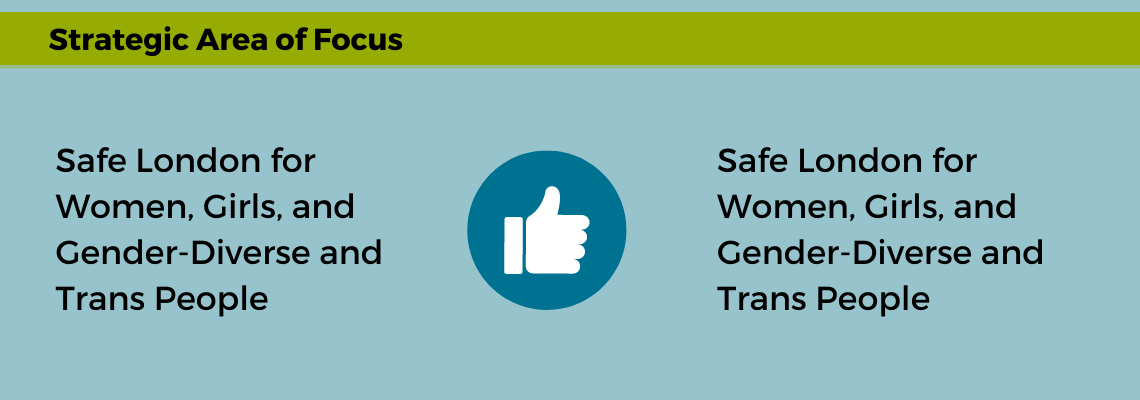 Advocacy from Anova and the London Abused Women’s Centre helped to safeguard “Safe London for Women, Girls, and Gender-Diverse and Trans People” as an area of strategic focus. Only four years ago, London became the first Canadian city to embrace this as a stand-alone pillar of its strategic plan. Despite a challenge this year, it remains in the strategic plan as adopted by Council. You can watch Jessie Rodger, Executive Director of Anova and Jennifer Dunn, Executive Director of the London Abused Women's Centre present to Council’s Strategic Priorities and Policy Committee here.
Advocacy from Anova and the London Abused Women’s Centre helped to safeguard “Safe London for Women, Girls, and Gender-Diverse and Trans People” as an area of strategic focus. Only four years ago, London became the first Canadian city to embrace this as a stand-alone pillar of its strategic plan. Despite a challenge this year, it remains in the strategic plan as adopted by Council. You can watch Jessie Rodger, Executive Director of Anova and Jennifer Dunn, Executive Director of the London Abused Women's Centre present to Council’s Strategic Priorities and Policy Committee here.
-
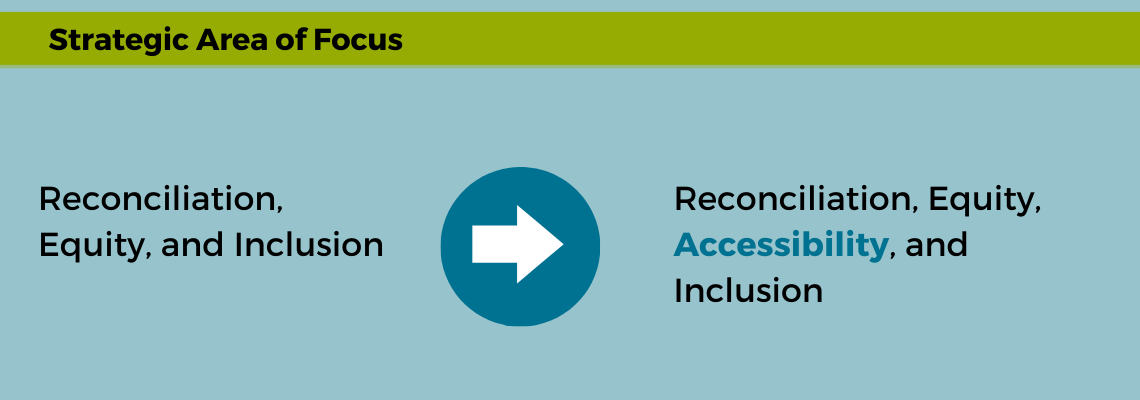 While we might be drawn to identify and advocate for what’s missing from the draft plan, we must remember to incorporate what we already liked in the Draft Strategic Plan into future advocacy toward budgeting and implementation. For example, in her remarks to Councillors, Pillar Interim CEO Maureen Cassidy expressed gratitude for the place of prominence given to Reconciliation, Equity and Inclusion and especially for the acknowledgement of the 13 municipal-focused Truth and Reconciliation Commission Calls to Action. This area is made even stronger by the addition of “accessibility” in the adopted version, but will still require advocacy for specific measures to appear in the multi-year budget.
While we might be drawn to identify and advocate for what’s missing from the draft plan, we must remember to incorporate what we already liked in the Draft Strategic Plan into future advocacy toward budgeting and implementation. For example, in her remarks to Councillors, Pillar Interim CEO Maureen Cassidy expressed gratitude for the place of prominence given to Reconciliation, Equity and Inclusion and especially for the acknowledgement of the 13 municipal-focused Truth and Reconciliation Commission Calls to Action. This area is made even stronger by the addition of “accessibility” in the adopted version, but will still require advocacy for specific measures to appear in the multi-year budget. -
And, despite our many successes, not everything that nonprofits advocated for made it into the strategic plan, so we may need to identify items that can carry some of our best un-adopted ideas forward.
 But this does seem the ideal time for nonprofits to pool their wisdom and help advise the City toward a multi-year budget that builds a better London for nonprofits and the communities we serve. Among the most interesting changes to the draft strategic plan was the addition of Collaboration to the City's statement of values, one of only two revisions of the values. We are likewise encouraged that the City is already operating in tune with this value as evidenced by the Whole of Community System Response.
But this does seem the ideal time for nonprofits to pool their wisdom and help advise the City toward a multi-year budget that builds a better London for nonprofits and the communities we serve. Among the most interesting changes to the draft strategic plan was the addition of Collaboration to the City's statement of values, one of only two revisions of the values. We are likewise encouraged that the City is already operating in tune with this value as evidenced by the Whole of Community System Response.All to say that even if “you can’t fight City Hall,” we can certainly work with City Hall. It's on us, now, to be good collaborators.
